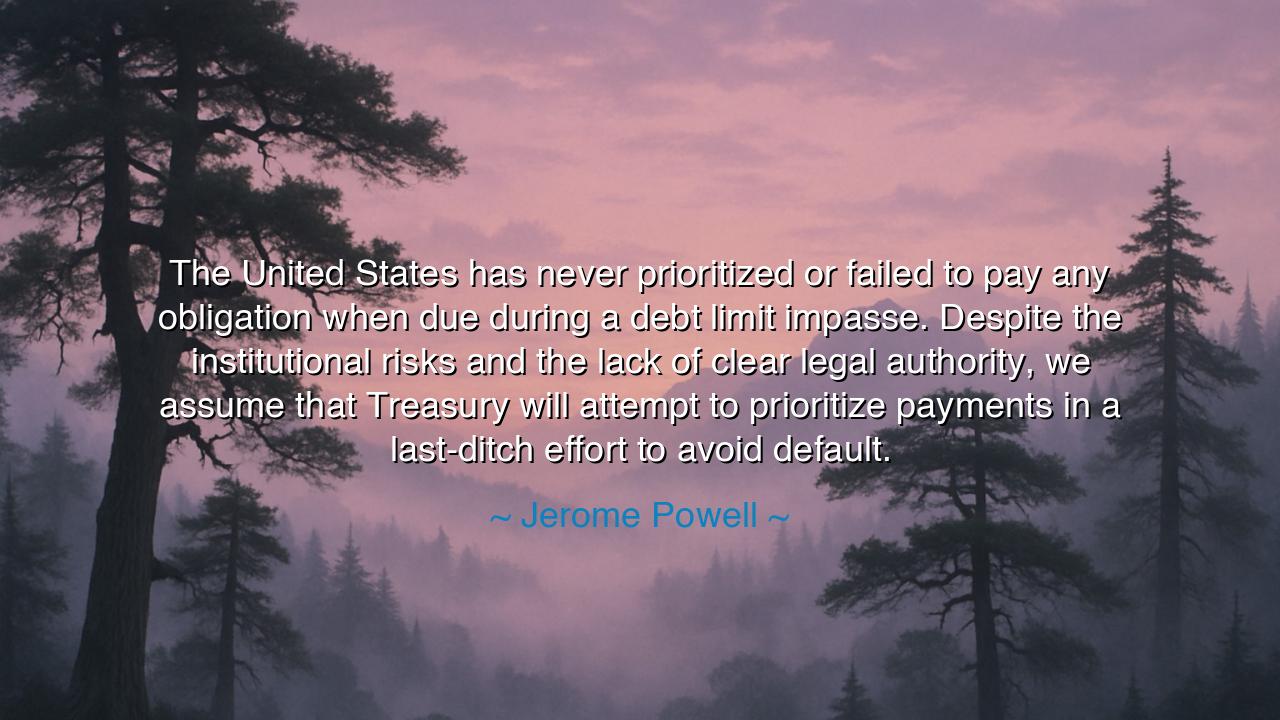
The United States has never prioritized or failed to pay any
The United States has never prioritized or failed to pay any obligation when due during a debt limit impasse. Despite the institutional risks and the lack of clear legal authority, we assume that Treasury will attempt to prioritize payments in a last-ditch effort to avoid default.






The words of Jerome Powell, “The United States has never prioritized or failed to pay any obligation when due during a debt limit impasse. Despite the institutional risks and the lack of clear legal authority, we assume that Treasury will attempt to prioritize payments in a last-ditch effort to avoid default,” ring with the gravity of a statesman standing at the edge of history. These are not words of panic, but of solemn remembrance — the voice of one who knows that nations, like men, are bound by their promises, and that to default is not merely to falter in payment, but to wound the trust upon which civilization itself stands. Powell’s words are both reassurance and warning, born from the ancient covenant of credit, where faith, honor, and responsibility are the invisible pillars that hold empires upright.
The origin of this quote lies in the recurring crises of America’s debt ceiling — moments when the mightiest economy on Earth teeters on the edge of uncertainty, not from lack of wealth, but from division of will. Time and again, the United States has approached the abyss of default, yet each time has drawn back, preserving its unbroken record of honoring every debt. In this, Powell invokes the legacy of generations: from Alexander Hamilton, who bound the newborn Republic’s future by pledging its credit, to the modern custodians of finance who guard that sacred trust. His words remind the nation that credit is not a number, but a mirror of integrity — that to fail to pay is not merely an economic sin, but a moral collapse, a breach of the covenant between past and future.
In his statement, Powell speaks as both economist and philosopher. He acknowledges that in a true debt limit impasse, the Treasury Department — the guardian of the nation’s purse — would stand upon uncertain ground, forced to choose among obligations without clear legal guidance. This, he calls “institutional risk.” Yet even in such peril, he affirms a deep faith: that the nation will strive, even in chaos, to prioritize its duties — to pay what must be paid, to honor what must be honored. For in the eyes of the world, a nation’s worth is not measured only in wealth, but in the steadiness of its word. And America, he declares implicitly, will not be the first to break that word.
The ancients understood the power of such faith. In Rome, the fides publica — the public faith — was sacred. A debt unpaid by the state was seen as a stain upon the Republic itself, for it signaled disorder within the soul of the government. So too in the days of the Han Dynasty, or the rule of England’s early kings, the collapse of trust in a ruler’s bond heralded not mere financial ruin, but social decay. For trust, once broken, cannot be swiftly restored. Powell’s message is born of that same wisdom: that a default would not simply shake markets, but shake the moral architecture of the world order built upon America’s credibility.
Consider, as an echo from history, the tale of Alexander Hamilton, the first U.S. Treasury Secretary, who faced a nation drowning in Revolutionary War debt. The fledgling United States could have abandoned its obligations — after all, it was poor, fractured, and uncertain. But Hamilton refused. “A national debt,” he said, “if it is not excessive, will be to us a national blessing.” He knew that by paying its debts fully and faithfully, America would purchase something far greater than solvency — it would purchase trust. And so it did. Foreign investors, once skeptical, began to believe in the young republic. Its credit became its backbone, and its honor became its currency. Powell’s quote carries that same spirit forward: to pay one’s debts, even in adversity, is the act by which nations prove their character.
Yet beneath his calm acknowledgment lies a subtle plea — a call to wisdom in governance. “Despite the lack of clear legal authority,” he warns, the system should never have to rely on improvisation to avoid collapse. For every crisis of debt is not merely financial, but moral — a test of whether leaders will put aside pride and partisanship to preserve the foundation of trust upon which all prosperity depends. The debt ceiling, then, becomes a symbol of human folly — of how greatness can be threatened not by poverty, but by the refusal to cooperate. Powell’s words urge the powerful to remember that the machinery of civilization cannot run on fear or arrogance, but only on shared responsibility and foresight.
Let this lesson be passed to future generations: a person, a family, or a nation stands tall not by the gold it holds, but by the promises it keeps. When obligations come due — in money, in honor, or in duty — they must be met, for that is the foundation of trust. As Jerome Powell teaches, even in moments of confusion and risk, a wise people will find a way to uphold their commitments, lest the fabric of trust unravel. And so, let every citizen remember: debts are not only financial burdens, but moral bonds — the measure of integrity between self and society. To keep faith, even when the path is uncertain, is the mark of greatness; to abandon it is to let the temple of order crumble into dust.






AAdministratorAdministrator
Welcome, honored guests. Please leave a comment, we will respond soon